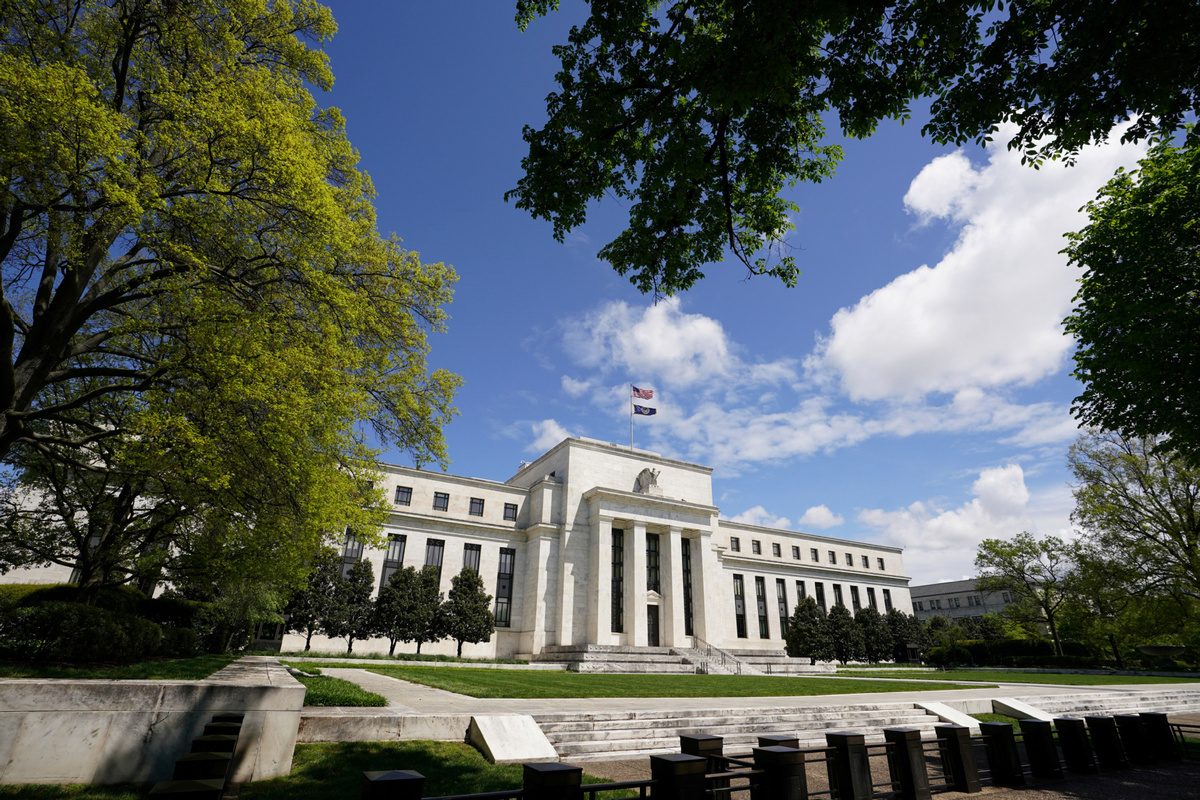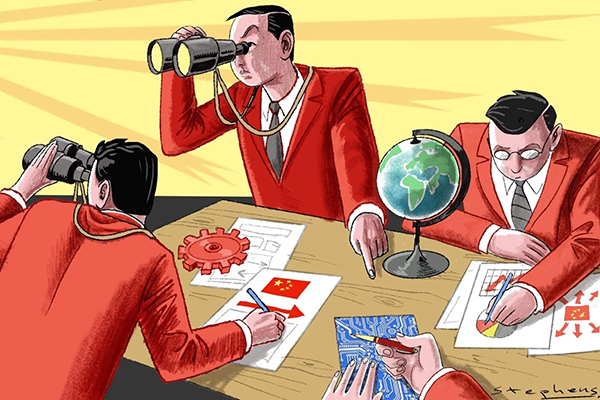Laurence Brahm: Money mirrors in the circus are not real magic
January 27 , 2021
I grew up in the circus. As a child, my parents were entrepreneurs running carnivals and fairs. Yes, those places kids love to go in the summer and autumn to eat sticky cotton candy, ride Ferris wheels, merry-go-rounds and roller coasters, throw darts at balloons, and watch magic shows. Working at all these different fairgrounds as a kid, I became friends with all the magicians. I learned some of their tricks.
Mirrors are often used to create an illusion of something being there that is not. This is key to many magic performances, regardless of scale, small or grand. The Federal Reserve in Washington has learned much from the multimirror illusions of circus magicians.
Following the sub-prime incited global financial meltdown in 2008, then Federal Reserve chairman Bernard Bernanke and then treasury secretary Henry Paulson were determined not to let their Wall Street cronies take responsibility for misusing depositors’ money in speculating on obscenely overrated sub-junk quality investment products. So they introduced a policy called quantitative easing, a very scientific-sounding way of covering up reality. Wall Street had crashed, the banks were in default, and the Federal Reserve had no money, because the Treasury was in debt from the White House’s overspending on senseless ideological wars. So what to do? Sit back with some of that really sticky cotton candy and watch the magic show.
At moments like that, the game of mirrors comes in handy. The Federal Reserve decided to buy back all of its debt by issuing new currency liquidity backed by that same debt. How can that be done? Its like pulling rabbits out of a hat. Just use one mirror to reflect what is not in another mirror and place something somewhere else in front of the other mirror and suddenly you are surrounded by a lot of the same thing being reflected in the mirage of mirrors. That means a lot of rabbits.
While introduced under the Republican administration of George W Bush, the policy of quantitative easing ran a beeline throughout the administration of Barack Obama with then Federal Reserve chairwoman Janet Yellen carrying the policy into the Trump administration when it was re-dubbed repo. Every presidential administration wants to say it is doing things differently from the previous one, even if in the end it is all the same. More mirrors, many more rabbits.
Obama’s four rounds of quantitative easing that began with a $800 billion stimulus, ended at $2.85 trillion before he left office. Suddenly, George W Bush’s fiscal cowboy spending spree seemed frugal by comparison. Obama’s quantitative easing money did not go into badly needed infrastructure or community programs for employment as promised in his long-winded campaign speeches. It went right into the hands of the same bankers who had created the mess to begin with. They in turn threw the money right back at the virtual economy rather than the real one, investing in speculative social media technology firms underlying what would become historically the biggest, most unprecedented surveillance system through data harvesting and manipulation of thought patterns ever imagined. Suddenly America’s intelligence services, Wall Street and ex-hippies-turned-tech moguls were all sleeping in the same bed. All paid for with debt that would transition the American dream of class mobility to caste stagnation, assuring debt serfdom of generations to come.
Donald Trump’s presidential campaign promise was to clear up all this debt, a factor that galvanized the vote of the ex-middle class now fallen to the bottom rungs of the social economy. Instead of keeping his campaign promise, Trump like Obama pumped up the debt-to-liquidity to a whopping staggering $3.584 trillion in dollar debt-backed stimulus by 2020, effectively putting the entire economy on debt-induced life support. Where Obama put the economy on debt steroids, Trump overdosed it on debt ayahuasca.
In 2020 alone, $3.584 trillion had been issued under Trump. To put this in perspective, China’s total foreign exchange reserves are just over $3.2 trillion after 40 years of painful economic reform, the costs of opening and developing its export economy.
Just as Obama before him, Trump’s unprecedented debt-backed liquidity flooded into techy social media monopolies beholden to Fed stimulus. Capital markets skyrocketed to incredulous heights while American unemployment reached unprecedented highs and food lines historically unimaginable lengths, not seen since the Great Depression. Main Street had become decoupled from Wall Street. For many, this was not an illusion.
So throughout the year of living dangerously of 2020, people took to the street. Some claimed to represent Q Anon, others Antifa and Black Lives Matter. Regardless, they all had the same frustration. The issuing of massive debt backed liquidity to support a few virtual reality companies and Wall Street is making a tiny elite grotesquely superrich while taking the American middle class and relegating them to join the impoverished. What is happening in the street now in America is class struggle in its most raw and brutal form because the middle class has become totally disenfranchised.
What the triangular game of the Federal Reserve, Wall Street and Silicon Valley did not reflect in its game of mirrors was the new reality. United States Federal debt is close to $28 trillion with public debts already surpassing 100 percent of the GDP. The problem is that America has put the real economy into museums, opting for a game of mirrors. So what is the rest of the world supposed to do? Well, better get some mirrors and create the illusion of lots of rabbits.
In fact many other major economies are now following this pattern of debt buy-back for liquidity, causing a dangerous shift in the world economy from businesses that once employed people and invigorated communities to dependency upon capital market arbitrage, exacerbating social and economic rifts between the now Godzilla rich and the increasing masses of poor.
The amount of debt-backed money printed globally since 2008 now equals to the total amount of money ever printed over the 5,000-year known history of civilization. Should we consider this an accomplishment?
Now breathe a sigh of relief. Joe Biden has finally been sworn in as President of the United States in a ceremony that nobody could get near because of the 20,000 or more troops protecting the capital building. Now with Biden in charge, all of this will change, right?
Think again.
Janet Yellin is back as treasury secretary. Formerly she served as Fed chairman in the Obama-Trump transition era debt-to-liquidity super splurge. She has already pronounced an “act big” policy. The problem is that many countries have used their national reserves to buy American debt, which is now being squandered at their expense. This kind of psychotic money printing prevents inflation in America but will assuredly export it to other countries.
Only America can do this because the US dollar is the planet’s dominant reserve currency, so the Fed has a magic money-printing machine. But really, for how long? “The US can pay any debt it has because we can always print money to do that,” reflected former Fed chairman Alan Greenspan in 2011. “So there is zero probability of default.”
So with the presidency of Joe Biden can we expect change? Now stop looking at the social media and really think hard! Joe Biden is scheduled to kick off his presidency by issuing $1.9 trillion as a stimulus that will spread money across the economy, but not address infrastructure. Yes we are hearing the same Obama promises of investment into green energy and new infrastructure. But that did not happen last time. So don’t expect investment into the hard-core assets needed to transition grids from fossil fuels to green. Another $3 trillion is expected by mid-year. It will be underwriting the tech social media monopoly big data surveillance industry. So just like in Obama’s time, the rhetoric has changed but not the game.
Citigroup former CEO Chuck Prince has given us some good advice on how to play the market and make more rabbits for each and every one of us while the mirror game goes on until they crack and crumble into tiny glass fragments. On the Fed’s debt-for-liquidity splurge Prince says, “When the music stops, in terms of liquidity, things will be complicated. But as long as the music is playing, you’ve got to get up and dance. We are still dancing.” That means play the market as long is it is being artificially propped up, but try to be smart and short before the dancers have cardiac arrest.
America’s economy is a massive debt pyramid scheme. Debt infests every aspect of life. You borrow for your house, car and education. You cannot even go to a Best Buy and purchase a cheap cell phone without getting tied up into a loan program. Everyone is living on borrowed time.
That is why so many people are coming out to protest violently. It is not about racism or populism. Certainly these are catalysts for people to take action. But the more deeply rooted problem lies in all the printed capital being hoarded by a tiny elite and their monopoly social media corporations and financial groups, while the vast majority of people are being economically disenfranchised in their own country. By the way, that’s how empires collapse. Just take out the history book, and read it.
From China Daily , 2021-1-27
Topical News See more






